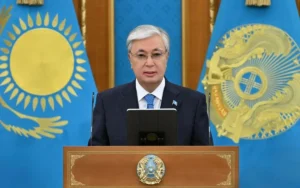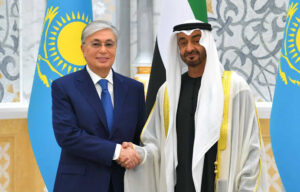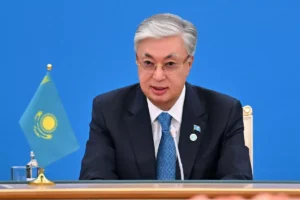Kazakhstan Highlights Global Leadership at UNCCD COP16 in Riyadh

Riyadh, The Gulf Observer: The Kingdom of Saudi Arabia has assumed the presidency of the 16th Conference of the Parties (COP16) to the United Nations Convention to Combat Desertification (UNCCD), marking a pivotal moment in the fight against global land degradation and drought. Held in Riyadh, this major international gathering brings together policymakers, organizations, and key stakeholders to address urgent environmental challenges.
The official recognition of Saudi Arabia’s presidency took place during the opening plenary session, with the Minister of Environment, Water, and Agriculture, Eng. Abdulrahman Abdulmohsen AlFadley, outlining an ambitious vision for the conference. In his remarks, Minister AlFadley emphasized the critical importance of restoring 1.5 billion hectares of degraded land by 2030, aligning efforts with global climate and biodiversity goals. He stressed that decisive action is essential to mitigate the devastating impacts of land degradation, which affects over 3 billion people and costs the world more than $6 trillion annually.
This year’s COP16 is the largest in the history of the convention, introducing a dedicated Green Zone to foster collaboration and secure funding for land restoration projects. On the first day, Saudi Arabia launched the Riyadh Global Drought Resilience Partnership, supported by pledges totaling $2.15 billion from the Islamic Development Bank, the OPEC Fund, and Saudi Arabia itself. The partnership aims to transition from crisis-driven drought responses to proactive resilience strategies. Additionally, initiatives such as the International Drought Resilience Observatory and the Global Drought Atlas were unveiled to enhance monitoring and prevention capabilities worldwide.
UNCCD Executive Secretary Ibrahim Thiaw commended Saudi Arabia for its leadership, citing its initiatives like the Saudi Green Initiative and Middle East Green Initiative as key contributions to global sustainability efforts.
Kazakhstan played a prominent role in COP16 through the active participation of the Islamic Organization for Food Security (IOFS), headquartered in Nur-Sultan. Ambassador Berik Aryn, Director General of IOFS, held a series of high-level meetings with global leaders and international organizations to advance food security, climate resilience, and sustainable development initiatives.
During his visit, Ambassador Aryn met with Tunisia’s Minister of Environment, H.E. Habib Abid, to discuss collaborative efforts aimed at promoting sustainable agriculture and enhancing climate resilience across North Africa. He also engaged in productive talks with Dr. Sultan Al-Marshad, CEO of the Saudi Fund for Development, exploring avenues to finance rural development and food security projects in IOFS member states.
Ambassador Aryn’s meeting with OPEC Fund President H.E. Abdulhamid Alkhalifa focused on addressing food insecurity through innovative, climate-smart agricultural solutions. Similarly, discussions with Islamic Development Bank Chairman Dr. Muhammad Sulaiman Al Jasser centered on scaling investments in sustainable farming practices and climate change mitigation. Aryn also collaborated with Dr. Nasr Eddin Al-Obaid, Director-General of the Arab Center for the Studies of Arid Zones and Dry Lands (ACSAD), to tackle food security challenges in arid regions through research-driven innovations.
Speaking on Kazakhstan’s role, Ambassador Aryn highlighted IOFS’s commitment to fostering global partnerships that address the interconnected issues of food security, climate change, and sustainable development. He emphasized that Kazakhstan’s leadership in hosting IOFS positions the country as a critical player in creating resilient food systems that can withstand environmental challenges.
As COP16 unfolds, Kazakhstan continues to assert its influence on the global stage, demonstrating a steadfast commitment to addressing urgent environmental and humanitarian challenges in collaboration with international partners.


